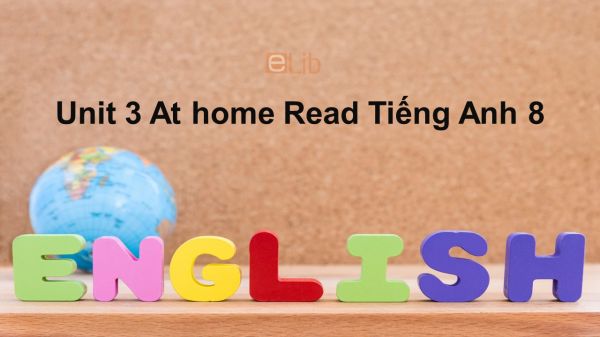Unit 3 lớp 8: At home-Read
Bài học Unit 3 lớp 8 "At home" phần Read giúp các em tăng vốn từ vựng của mình thông qua chủ đề những rủi ro có thể xảy ra trong nhà, nhất là nhà bếp và khi chúng ta ở nhà chỉ có một mình hay có trẻ em. Qua đó thực hành các dạng bài tập chọn các phát biểu đúng, sai và trả lời câu hỏi.
Mục lục nội dung

Lan’s mother, Mrs. Quyen, is at her local community center. She is reading one of the posters on the wall (Bà Quyên, mẹ của Lan ở trung tâm cộng đồng địa phương. Bà đang đọc áp phích treo trên tường)
Safety Precautions in the Home
- You must put all chemicals and drugs in locked cupboards. Children may drink or eat these things because they look like soft drinks or candy.
- You must not let children play in the kitchen. The kitchen is a dangerous place.
- You have to make sure children do not plav with matches. Each year, fire destroys homes and injures children because someone plays with matches. Remember, it only takes one match to cause a fire.
- You must cover electrical sockets so that children do not try to put anything into them. Electricity can kill.
- You have to keep all dangerous objects out of children's reach. These include scissors, knives, and small objects such as beads.
Tạm dịch
Cảnh báo an toàn trong nhà
- Bạn phải để toàn bộ hoá chất và thuốc uống vào tủ có khoá. Trẻ có thể uống hoặc ăn những thứ này bởi vì chúng có vẻ giống các loại nước giải khát hay kẹo.
- Bạn không được phép cho trẻ chơi ở trong bếp. Bếp là một nơi nguy hiểm.
- Bạn phải chắc rằng trẻ không chơi diêm. Mỗi năm, hỏa hoạn thiêu hủy nhà cửa và làm trẻ bị thương bởi vì có người chơi diêm. Nên nhớ rằng chỉ một que diêm cũng gây hỏa hoạn.
- Bạn phải che đậy các nguồn điện để trẻ không thể đặt bất cứ thứ gì vào chúng. Điện có thể làm chết người.
- Bạn phải đặt tẩt cả các vật nguy hiểm ra khỏi tầm với của trẻ. Những vật này gồm kéo, dao và các đồ vật nhỏ như hạt cườm.
1. Task 1 Read Unit 3 lớp 8
Answer (Trả lời)
True or false? Check (✓) the boxes. Correct the false sentences (Đúng hay sai. Đánh dấu (✓) vào các ô. Sửa câu sai)
T F
.png)
.png) a) It is safe to leave medicine around the house (Để thuốc quanh nhà là an toàn)
a) It is safe to leave medicine around the house (Để thuốc quanh nhà là an toàn)
.png)
.png) b) Drugs can look like candy. (Thuốc có thể trông giống kẹo)
b) Drugs can look like candy. (Thuốc có thể trông giống kẹo)
.png)
.png) c) A kitchen is a suitable place to play. (Bếp là nơi có thể chơi)
c) A kitchen is a suitable place to play. (Bếp là nơi có thể chơi)
.png)
.png) d) Playing with one match cannot start a fire. (Chơi với một que diêm thì không thể gây ra cháy)
d) Playing with one match cannot start a fire. (Chơi với một que diêm thì không thể gây ra cháy)
.png)
.png) e) Putting a knife into an electrical socket is dangerous. (Đặt một con dao vào một ổ điện là nguy hiểm)
e) Putting a knife into an electrical socket is dangerous. (Đặt một con dao vào một ổ điện là nguy hiểm)
.png)
.png) f) Young children do not understand that many household objects are dangerous. (Nhiều đưa trẻ không hiểu rằng có nhiều dụng cụ trong nhà rất nguy hiểm.)
f) Young children do not understand that many household objects are dangerous. (Nhiều đưa trẻ không hiểu rằng có nhiều dụng cụ trong nhà rất nguy hiểm.)
Guide to answer
a) F
It is safe to keep medicine in locked cupboards.
b) T
c) F
A kitchen is a dangerous place to play.
d) F
A match/ Playing with one match can start a fire.
e) T
f) T
2. Task 2 Read Unit 3 lớp 8
Ask and answer (Hỏi và trả lời)
a) Why must we put all chemicals and drugs in locked cupboards?
Because children often try to eat and drink them.
b) Why mustn’t we let children play in the kitchen?
Because ____________________ .
c) Why mustn’t children play with matches?
Because ____________________ .
d) Why must we cover electrical sockets?
Because ____________________ .
e) Why do we have to put all dangerous objects out of children’s reach?
Because ____________________ .
Guide to answer
a) Why must we put all chemicals and drugs in locked cupboards? (Tại sao chúng ta phải để thuốc vào trong tủ khóa?)
⇒ Because children often try to eat and drink them. (Vì lũ trẻ thường cố uống và ăn chúng.)
b) Why mustn’t we let children play in Ihe kitchen? (Tại sao chúng ta không được cho trẻ chơi trong bếp?)
⇒ Because the kitchen is a dangerous place. (Vì bếp là nơi nguy hiểm)
c) Why mustn’t children play with matches? (Tại sao chúng ta không nên cho trẻ nghịch diêm?)
⇒ Because one match can cause a fire and fire destroys homes and injures children. (Vì chỉ một que diêm là có thể gây ra hỏa hoạn và phá hủy nhà và làm bị thương trẻ nhỏ.)
d) Why must we cover electrical sockets? (Tại sao chúng ta phải bọc các ổ cắm điện?)
⇒ Because children can put anything into electric sockets. Electricicty can kill them. (Vì trẻ có thể cho bất cứ thứ gì vào ổ cắm. Dòng điện có thể giết chúng.)
e) Why do we have to put all dangerous objects out of children’s reach? (Tại sao chúng ta phải đặt tất cả các vật nguy hiểm khỏi tầm với?)
⇒ Because they can injure and even kill children. (Vì chúng có thể làm bị thương và thậm chí gây chết người với lũ trẻ.)
3. Practice
Read the following passage and choose the best answers to each of the questions below (Đọc đoạn văn và chọn câu trả lời cho các câu hỏi bên dưới)
I live in a house near the sea. It’s an old house, about 100 years old, and it’s very small. There are two bedrooms upstairs but no bathroom. The bathroom is downstairs next to the kitchen and there’s a living room where there is a lovely old fireplace. There’s a garden in front of the house. The garden goes down to the beach and in spring and summer there are flowers everywhere. So, I have a lot of visitors. My city friends often stay with me. I love my house for many reasons: the garden, the flowers in summer, the fire in winter, but the best thing is the view from my bedroom window.
1. Where does the author live?
A. near the sea
B. in the country
C. in the city
D. A & B
2. How many rooms are there in his/ her house?
A. two B. three
C. four D. five
3. There’s a garden ___________ the house.
A. in front of
B. behind
C. beside
D. beneath
4. The author loves the house because of ___________.
A. the garden
B. the flowers in summer
C. the fire in winter
D. all are correct
5. What does the author like best?
A. the lovely old fireplace
B. the garden
C. the flowers in spring and summer
D. the viewfrom his/ her bedroom window.
4. Conclusion
Qua bài học này các em cần lưu ý một số từ vựng quan trọng như sau
- safety (n): sự an toàn
- precaution (n): sự cảnh báo, phòng ngừa
- chemical (n): hóa chất
- drug (n): thuốc
- locked (adj): được khóa
- match (n): diêm
- fire (n): lửa
- destroy (v): phá hủy
- injure (v): làm bị thương
- electrical socket (n): ổ cắm điện
- electricity (n): điện
- out of children’s reach: xa tầm với của trẻ con
- scissors (n): cái kéo
- bead (n): hạt, vật tròn nhỏ
